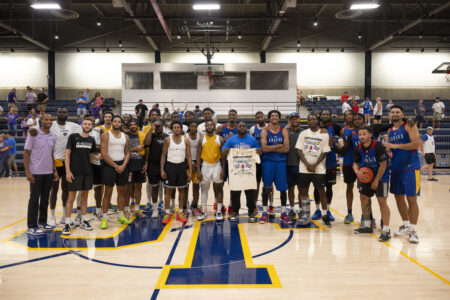Opinion: McLemore case exposes the seedy underworld of college basketball
Think of the college basketball we watch on television as the most beautiful stretch of landscape you ever have seen. It may be a mountain vista or a Maui beach or the sights on an Alaskan cruise.
But under that beautiful slice of earth lies the foul underworld of college basketball–the part that involves the pursuit of top NBA prospects by disreputable agents who pay recruiters. Think of that underworld as a tunnel that carries raw sewage.
Thanks to a USA Today report over the weekend that detailed accusations made by Kansas star Ben McLemore’s AAU coach, Darius Cobb, we all have had a window to that seedy underworld opened for us.
The gist of Cobb’s allegations: Serving as what is known in the industry as an “agent runner,” a man wormed his way into the life of McLemore’s AAU coach and family members in an effort to steer McLemore’s choice of agents. He paid for McLemore’s birthday party and for trips to Los Angeles for Cobb and a family member to meet with agents. And, Cobb said, he was given two $5,000 payments.
In the underworld sewer beneath college basketball, these “runners” are among the most insidious vermin. The No. 1 reason Kansas coach Bill Self sequesters his players in their hotel rooms during the NCAA tournament is to keep them away from toxic runners.
Now Kansas basketball fans are left wondering whether the NCAA could come down on the program — which goes to great lengths to warn players against getting involved with runners — for the actions of outsiders.
If Self spent all of his energy trying to identify runners and keep them away from his athletes’ friends and family members, he wouldn’t have any time left to yell at his players, implement a defensive strategy that stymies the next opponent or pump up the sagging confidence of a slumping shooter.
Based on the USA Today report, by Eric Prisbell, what happened with McLemore fit a typical pattern: A runner (Rodney Blackstock) wormed his way into the life of the NBA prospect (McLemore) through someone who already was close to the prospect (Cobb, his AAU coach). In the McLemore case, the runner-enablers are Cobb and it appears, though he denied it to USA Today, McLemore’s cousin, Richard Boyd.
Cobb told USA Today that Blackstock paid for him and Boyd to make trips to Los Angeles to meet with agents. If true, that sets up this scenario: The runner receives money up front from multiple agents and a big bonus on the back end from the agent the player chooses — or if he really hits a grand slam, the runner becomes the agent himself.
The player doesn’t have any idea others are cashing in on his talent. It’s best to keep him out of the loop for fear he might resent having his blood sucked by so many.
According to USA Today, McLemore requested tickets for Blackstock for a few KU games. Chances are that was no problem for the Kansas coaches; the name meant nothing to them. He’s not an agent. Why should anyone know his name or worry about him? He seemed to be just a friend of the player.
Let’s say Cobb or Boyd asked McLemore to leave tickets for Blackstock. Even if they told McLemore he was going to introduce the family to prospective agents who could lend advice, there is no rule against that, as long as the runner and/or agents don’t pay for anything and the player doesn’t sign with an agent before exhausting his eligibility. But runners don’t care about breaking the rules.
Runners don’t wear a scarlet ‘R’ on their foreheads, so they aren’t always easy to spot. In some cases, a runner might be a mutual friend of a former teammate. They qualify as the single biggest distraction to college basketball players, particularly at tournament time. Not only do they divert a player’s attention to the NBA, they also are known to whisper in a prospect’s ear bad advice such as, “This is your last chance to show the reputation on you is wrong, that you really do have a good outside shot.” Or, “Your coach is holding you back. You need so show the scouts you can take over games.”
Cobb told USA Today that Blackstock paid for McLemore’s birthday party at Wayne and Larry’s. How could Self or anyone on his staff have prevented that? Nothing short of turning student-athletes into prisoners who are transported in vans from class to class and from practice to their locked cells, with three squares delivered through a small window, could have prevented that. Even that wouldn’t work: Under those conditions, the agents would turn classmates or van drivers of the prospect into runners.
Coaches and administrators educate their players on what is and isn’t allowed. They warn them about potential parasites appearing in their lives. But in many cases, it’s not only out of the control of the coaches, it’s out of the control of the players.
Could the NCAA take victories away from Kansas by ruling that McLemore had lost his amateur status? Technically that’s possible, but not likely. If it does, the NCAA would create a great deal more work for itself, because college basketball programs will start turning each other in left and right, based on mostly true rumors that runners are picking up expenses of third parties close to players. It’s hardly an uncommon practice.
Nobody detests the existence of agent runners more intensely than coaches, some of the most controlling people on the planet. Yet even coaches can’t come close to controlling them.
Agent runners are people who when you see them you should make you run in the opposite direction as fast as you can to the nearest scalding hot shower — just in case some of their slime has rubbed off on you.







